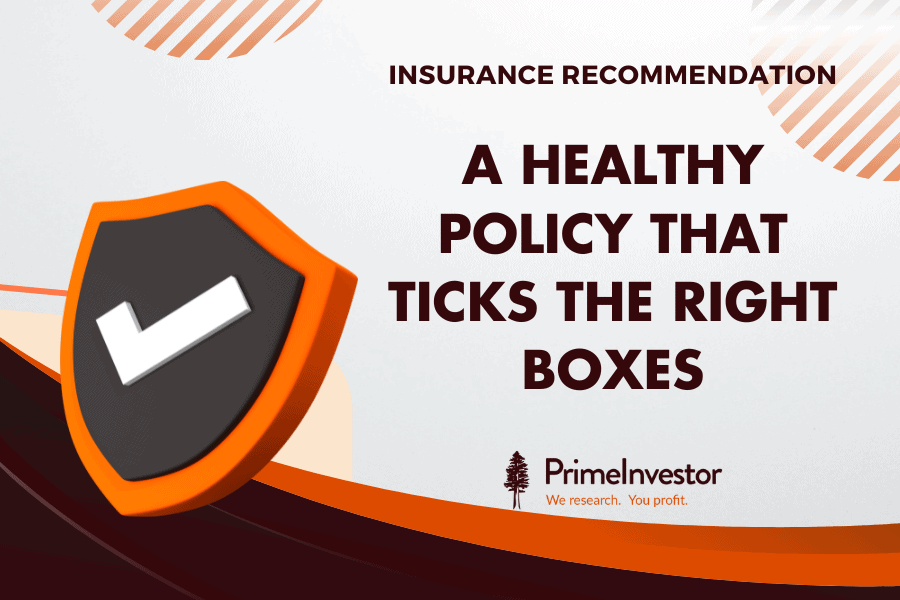Often, researching for your health insurance doesn’t stop at finding a good insurer and policy. The sub plans, options, and addons under a policy warrant more research to find out the best combination for you and to help you squeeze out the most benefit from your policy.
Today, we take up Bajaj Allianz Health Guard, with a wide range of sub-options that can make it better. This policy is part of our Prime Health Insurance recommendations.

First, a bit of background on the insurer. Bajaj Allianz is a joint venture between Bajaj Finserv Limited and Allianz SE. It is a large private sector insurer in India and ranks 9th among all insurers in terms of total premium earned and incurred claims, 5th among private insurers. The claim settlement history of Bajaj Allianz has been good. The ratio of claim settlement by numbers and value at 88.78% and 90.69% respectively compares well to the 78.43% and 86.74% industry average. The efficiency in settlement – i.e., the proportion of claims settled within 3 months – is also better than average at 98.16%, where industry average is 96.56%. All values are based on data for FY22. Please read this article to understand the claim settlement metrics.
Policy features
We start off with the basics. The policy is available for 18 to 65 year olds. Once the policy is purchased, it can be renewed for life. Dependent children of 3 months of age can be added into the policy. The policy provides both individual and floater options. A floater policy is one where the total coverage is shared between insured parties. It is best for families to use the floater cover option.
The policy has 3 plans as follows:.
- Silver, which has a coverage of Rs.1.5 lakh and Rs.2 lakh.
- Gold, which has coverage ranging from Rs.3 lakh to Rs.50 lakh.
- Platinum, which has a range Rs.5 lakh to Rs.1 crore.
What does it cover?
Apart from actual hospitalisation, (which is defined as admission in a hospital for a minimum period of 24 hours for procedures or treatments), the policy covers pre-hospitalisation and post-hospitalisation expenses of up to 60 days and 90 days, respectively. This means expenses incurred in relation to a hospitalisation is payable if it falls in the specified period.
Importantly, the policy also covers daycare treatments – that is, procedures that used to take more than 24 hours hospitalisation in the past, but are now completed in less than a day due to advancements in technology. Many policies otherwise tend to demand a 24-hour hospital stay to cover treatments.
Features that enhance the effective sum insured
Cumulative bonus is a feature that enhances the sum insured when no claims are made in a policy year. In the case of Silver and Gold plans, the bonus is 10% per year, subject to a maximum of 100% of sum insured. In the case of Platinum plan, a super cumulative bonus is applicable, where the bonus is 50% each for the first two claim-free years and 10% per year thereafter, subject to a maximum of 150% of sum insured.
Sum insured reinstatement benefit is available in this policy. This feature enables the insurer to automatically refill your sum insured once exhausted. This can be used for future claims except for the same disease for the same person.
Policy minuses
- Sub-limits on selected treatments: The policy has sub-limits on cataract surgery up to 20% of sum insured or Rs.1 lakh, whichever is lower. The policy also has a sublimit of up to 50% of sum insured or Rs.5 lakh, whichever is lower, for bariatric surgery. While this may be enough to cover actual expenses for some of the policyholders, depending on the sum insured, treatment expenses are only likely to rise. A hard limit on claims payable, even for a selected procedure, is a downside. See page 11 of the policy brochure for more details. There are policies like HDFC Ergo Optima Restore without this limitation.
- Permanent exclusions: A number of conditions and treatments are permanently excluded from this policy. These include treatment related to obesity, refractive error correction of eyesight, treatment of sterility, infertility etc. Please see the policy wordings, page 11 for full list of exclusions. However, these exclusions are pretty much the norm.
- 3-year waiting period for preexisting diseases: While the waiting period is not much higher than the industry average, we have cited it here as policies such as ICICI Lombard Complete Health Insurance Plan Health Shield and Star Health Young Star Insurance come with shorter waiting periods.
- Maternity benefits: Though the Gold and Platinum plans of the policy have maternity and newborn coverage, the applicable conditions and limits make it far from being useful. The maternity cover has a specific waiting period of 6 years. There is an additional sub-limit applicable. For a sum insured less than Rs.10 lakh, the amount payable for maternity expenses is limited to Rs.15,000 for normal delivery and Rs.25,000 for caesarean delivery. For a sum insured of Rs.10 lakh and above, the limits are Rs.25,000 and Rs.35,000 respectively.
Premiums
Bajaj Allianz Health Guard has zone-based premiums. The whole country is divided into three zones; Zone A, Zone B, and Zone C. Zone A has the highest premium, followed by Zone B, where premium is 20% less than that of Zone A. In the case of Zone C, the premium is 30% less than that of Zone A. For more details on the premium zones, see page 4 of the brochure.
The catch, though, is that for those who are not paying Zone A premiums, co-payments will be applicable as below:
- Those who are paying Zone B premiums will have to make 15% co-payment if the treatment is done in a Zone A city
- Those who are paying Zone C premiums will have to make 5%, or 20% co-payments respectively if the treatment is done in a Zone B or Zone A city.
The zone-based co-payment is not applicable for accidental hospitalisation cases.
For all comparisons here, we will be looking into the Zone A premiums.
For an individual aged 36 to 40, for a sum insured of Rs 10 lakh, the policy premium cited by the insurer is Rs 14,691. This compares favourably with Rs 16,701 for HDFC Optima Restore and is on par with Rs 13,895 for Star Comprehensive Insurance. It is a tad more expensive than the Rs 11,047 for ICICI Lombard Complete Health Insurance Plan Health Shield.
Similarly, for a family of four, with two adults aged between 36 to 40 and two children, for a sum insured of Rs 10 lakh, the premium will be Rs 27,317. This again compares similarly to the floater options of the insurers above – Rs 33,271 for HDFC Optima Restore, Rs 24,614 for ICICI Lombard Complete Health Insurance Plan Health Shield and Rs 27,754 for Star Comprehensive Insurance.
The policy’s premiums, therefore, are mid-range – neither too expensive but it would not suit those prize economy over features.
Which zone to choose? If you are residing and working in the same zone, you may choose that zone’s premium as you are likely to get treated in the same zone’s hospitals. If you are moving between zones as part of work you may choose the top Zone among them – the one with a higher premium in order to avoid co-payments.
Which plan to use
The Silver plan comes with lower sum insured and limits on room rent coverage (1% of sum insured per day). In our view, a basic health policy needs to have at least Rs 5 lakh in coverage. This makes it straightforward to avoid the Silver plan.
The comparison between the Gold plan and the Platinum plan is tricky. Both the plans have all the features we consider essential. The major differences between the plans are, one, the Gold plan is cheaper and two, the Platinum plan provides a higher cumulative bonus and a special feature enhances the basic coverage by up to 20%.
We recommend the Gold plan over Platinum plan on the following counts:
- Even after accounting for the 20% increase in basic coverage for the Platinum plan, the Gold plan provides more coverage in relation to the premium paid. For an individual of age 36-40, the Platinum plan has a premium of Rs.14,101 for a sum insured of Rs.5 lakh. This can be treated as a coverage of Rs.6 lakh including the 20% increase. However, in the case of the Gold plan, the premium for an individual of age 36-40 for a sum insured of Rs.7.5 lakh is Rs.13,747. The premiums for a family of 4 also follows the same pattern.
- Bonus is not a replacement of sum insured. The Platinum plan provides a 50% increase in sum insured for the first two years of no claims, while the Gold plan provides just 10%. However, an increase in cover due to cumulative bonus cannot be treated as a permanent increase in coverage. If you make a claim, the bonus will be cut back to the previous slab. For increasing cover, it is always better to use super top-up policies with a deductible equal to the coverage of your basic policy. This provides certainty of the coverage, unlike bonuses which may or may not be present and will depend on the claims raised in the future.
Discounts: should you opt?
Bajaj Allianz Health Guard comes with certain discounts that reduce the premium payable. We will see which are worth and which should be avoided:
- Online discount: The policy provides a discount of 5% if purchased directly. It cannot, however, be denied that an insurance agent may be helpful in raising a claim. If you think you can handle the claims process with minimal help, going for the online policy will be useful.
- Co-pay discount: Even though the policy doesn’t have a co-payment clause (with exception to the zone-based co-payments, explained in the premium section), you can voluntarily opt for a 10% or 20% co-payment to get a 10% or 20% discount on premiums respectively. In our view, such a discount may turn expensive as the amount of claim can reverse any savings you may stock up from the discounts. For example, a 20% discount on the illustration above on premiums works out to about Rs 3,000 – you would only need a single claim of Rs 50,000 to wipe out 3 years’ of discounts.
- Room-rent capping discount: The Gold and Platinum plans don’t have a room-rent clause. But you can voluntarily opt for this making the policy be subject to a room rent limit of 1.5% of sum insured, maximum up to Rs.7,500 per day. There is a discount of 10% and 5% on premiums for individual and floater plans for opting this. We believe this should be avoided by everyone. The room-rent cap applies not just to room – it in reality applies to the total claim amounts as well.
For example, let’s say the room rent limit is Rs.7,500 and the actual room rent was Rs.10,000. That is, the rent reimbursed by the insurer is 75% of the total. So, if your treatment came up to Rs.1,00,000, the maximum claim payable by the insurer will be Rs.75,000 only. With hospital room rents likely to increase in the future, this clause may seriously limit the claim payable by the insurer in the future, even if you think the discount on premium makes the limit worthwhile at today’s price. - Long-term policy discount: You can renew the policy for 1, 2, or 3 years. The 2 year policy will give a 4% discount and 3 year policy will give an 8% discount. This can be opted by those who can afford it to save premiums.
- Zone-based discount: As mentioned in the premiums section, you should opt for this based on your location. Opting for a lower zone just to save premiums is not a good strategy.
Why do we recommend this policy?
We like this policy’s Gold plan on the following counts.
- Favourable room rent coverage: For the Gold and Platinum plans, the policy covers a standard AC room. There are no limits on ICU coverage. Having no hard limits on room rent makes this policy continue to be useful in the future, when the room rents are expected to increase.
- Good claim settlement history: Bajaj Allianz has good claim settlement ratios in the industry.
- Restore benefits: Restore benefits enable the insurer to automatically refill your sum insured once exhausted. This can be used for future claims except for the same disease for the same person.
- Reasonable premiums: The premium of the policy is reasonable in accordance with the features it provides.
Final take
Bajaj Allianz Health Guard is a policy with all essential features from an insurer with a good claim settlement record. The various plans, zones and discounts make the policy a little complicated but sticking to the objective of having a health cover – to meet any unexpected emergencies – helps weed out the options that aren’t worth it and use those that help. Go for a 3-year plan if you can afford it, and make use of the online discount if you think you can handle any claim situation.






17 thoughts on “Insurance recommendation – A healthy policy that ticks the right boxes”
Hello Bipin,
Could you provide a tabular comparison between the recommended HIPs e.g. Health Guard, ICICGI HealthSchield, Optima from HDFC etc. This will be very useful for all.
What r benefits of having more than 1 heath policy or more than 1 floater policy for family?
For example
If family has floater health insurance of icici lombard of 10 lakhs and are not very much satisfied, and wish to take recommended bajaj policy, what r pros and cons
Regards
Hello,
You can buy additional health insurance and it will increase total coverage applicable.
Buying two basic policies will be expensive; as each of the policies will charge the policybuyer enough to provide full coverage upto the sum insured. It is upto the policyholder to claim which insurer if the claim amount is less than the sum insured of both the policies.
On the plus side, this effectively diversifies the risk of the claim being rejected.
Alternatively, one can buy a super top-up policy to enhance the coverage. Here plus side is that the buyer can buy a policy with a deductible equal to the basic policy’s sum insured and save premiums on the super top-up policy. On the downside, it doesn’t solve the issue if the policyholder is not satisfied with the existing policy.
On a different note, if a policyholder is not happy with the current policy, they can see if porting the policy is possible.
A list of recommended basic and super top-up policies: https://primeinvestor.in/prime-health-insurance/
The pros and cons of porting a health policy: https://primeinvestor.in/varsity/the-pros-and-cons-of-porting-a-health-policy/
Thanks
thanks
Hello Bipin,
I don’t see any comparison with Niva Bupa policies.
Also a request, if you could do comparison in a tabular fashion, its much easier to grasp and retain.
Regards,
Anand
Hello Anand,
We have a shortlist of insurers and we recommend policies by these insurers. In the review of Bajaj Allianz Health Guard, which is a recommended policy; we looked into similar policies from our recommend list for premium comparison.
For more details on the recommendation process, please see ‘Our selection process for recommendations’ section of Prime Health Insurance (https://primeinvestor.in/prime-health-insurance/). Our recommend policies are also listed in the Prime Health Insurance page.
Thanks for the feedback on presenting comparison.
Hi Bipin,
a) Is there some ready reckoner by which one can find out the premium payable after inputting age of customer, number/age of persons to be covered and desired sum assured?
b) If we are to port from some other health insurance plan to this one, what are the implications to bear in mind?
Hello,
To answer the questions:
a) Please see the policy’s premium chart here: https://www.bajajallianz.com/download-documents/health-insurance/health-guard/New-Health-Guard-Premium-Chart.pdf
b) Kindly refer to the following article for details on porting a health insurance policy: https://primeinvestor.in/varsity/the-pros-and-cons-of-porting-a-health-policy/
Thanks
An important feature to compare could be robotic treatments
If you can also do a similar article on HDFC optima restore. This policy has many variants. Does Bajaj allianze poicy have limits on modern treatment?
Thanks for the suggestion on HDFC Optima Restore review.
Bajaj Allianz Health Guard policy does not apply sub-limits on modern treatments.
Hello PI team,
Thanks for the recommendation on Health insurance. Can you please confirm the suitability of the Bajaj Allianz Heath Guard for NRI/OCI. Presently spending few months in India and plan to be in India(full time) in next 5-6 years. Objective is to hold health cover continuously from here on to cover any unplanned big expenses for health.
Looking forward for recommendations on top-up/Super top-up as well as it completes the portfolio of health insurance.
Thanks
Hello,
This policy does not cover treatments outside India. If you are ok with maintaining a policy that will offer coverage only while you are in India during the NRI tenure; you can consider buying this policy.
We have recommendations on Super Top-up policies. Please refer to Prime Health Insurance (https://primeinvestor.in/prime-health-insurance/)
Thanks.
Hello,
Does it mean that the insurance can be claimed only if the health issue occurred while staying in India? Or can we claim it if the health issue occurred while staying outside India but getting the treatment done in India?
Hello,
We can claim if the treatment is done in India; whether the health issue occurred while staying in India or not.
Thanks
Thanks for the response
Follow up Question,
Is there any rule/pre-requisite that a basic health insurance is necessary to buy a super top-up policy. I am planning to just get a super top-up policy (above 5 lakhs) without a basic health insurance, Willing to pay first 5 lakhs out of pocket, aim is to limit the expense to 5 lakhs and anything above that should be covered.
Hello
There is no prerequisite to have basic health insurance in order to purchase a super top-up policy. As you mentioned, the downside is that expenses up to the deductible of the super top-up policy must be paid out of pocket.
Comments are closed.